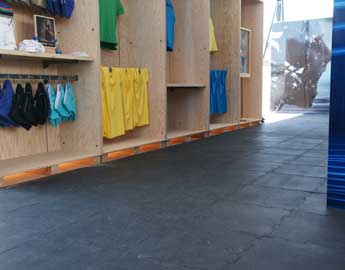 Interlocking rubber tiles — have you ever heard a more puzzling name? According to the Memidex Online Dictionary, the word “interlock” originates from “Old English...a bolt, bar, enclosure, prison” (Memidex). In this context, the above phrase may seem quite foreign to you. How is interlocking rubber flooring a prison? What exactly is it meant to enclose?
Interlocking rubber tiles — have you ever heard a more puzzling name? According to the Memidex Online Dictionary, the word “interlock” originates from “Old English...a bolt, bar, enclosure, prison” (Memidex). In this context, the above phrase may seem quite foreign to you. How is interlocking rubber flooring a prison? What exactly is it meant to enclose?
You might have an easier time imagining more ordinary floor materials such as ceramic tiles and vinyl floors. We see these surfaces every day in our kitchens, bathrooms, washrooms, and mudrooms. These common materials have their problems: ceramic tile counters are secured by moldy, stained grout, vinyl and laminate floors peel with old age, and hardwood floors are often dusty and easily scratched.
Interlock tile flooring, however, is a modular floor designed for simple Do-It-Yourself installation. Imagine a rubber floor cover that is easy to install and even easier to remove for cleaning. Some rubber interlocking floor mats are shaped like uniform puzzle pieces — they fit together as easily as a key in a lock. Other types of rubber tiles are secured by sturdy interconnecting pins. What does rubber flooring enclose?
The answer is this: all interlocking rubber tiles and mats are protective. Rubber flooring is meant to preserve, protect, and enclose lesser floor surfaces. As a protective barrier, rubber prevents costly damage. Some styles of rubber flooring are even tough enough to support heavy vehicles and storage equipment.
Let’s take a look at some common uses of interlocking rubber flooring.
For Your Garage
Rubber flooring tiles can be installed easily in your garage. If you do auto detailing or repairs, install rubber tiles in your garage to give yourself a soft, supportive surface on which to sit or stand for long periods of time. It’s definitely more comfortable than lying on concrete! Interlock tile flooring will also keep your garage floor free of oils, greases, and other fluids that may leak from cars. Just beware that if your floor is made with recycled rubber, oils are not a welcome mess, since they can damage the tiles.
 For Interior Uses
For Interior Uses
Believe it or not, you can use rubber flooring in your very own home. Do you want to set up your own personal gym? No problem! Cover your entire basement or garage floor with interlocking rubber mats for extra comfort and protection. Not only will you protect your floors from heavy exercise equipment, you will also decrease stress on your joints during heavy lifting, jump roping, and other high-impact sports. Flexible rubber mats provide superior comfort and shock absorption that is ideal for both home and commercial gyms.
For Industrial Areas
Rubber interlocking floor mats are also often used in large factories, warehouses, and manufacturing centers that may contain harmful chemicals and slippery liquids. Rubber’s natural anti-slip qualities are an asset in these situations: rubber matting can make industrial workplaces safer and more comfortable for all workers. Recycled rubber tires, especially, make great heavy-duty mats and flooring which will protect warehouse floors and machinery from damage.
Conclusion
Interlock rubber tiles make a great floor covering for a variety of applications. Do yourself a favor and make the easy choice. These tiles may be shaped like puzzle pieces, but interlocking rubber flooring is one jigsaw puzzle you won’t need a picture to solve!